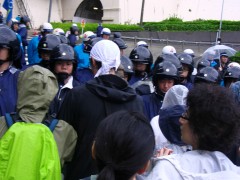23 January 2014
US Ambassador to Japan, Caroline Kennedy's Double Standard
Last Monday, US Ambassadar to Japan, Caroline B. Kennedy wrote the below comment on her twitter page.
"Deeply concerned by inhumaneness of drive hunt dolphin killing. USG opposes drive hunt fisheries."
I guess she was impressed by the documentary film "The Cove" which describes brutality of dolphin hunting in Taiji town in Mie Prefecture.
Whether her remark is right or wrong, it is double standard. So I replied to her as below.
"Double standard! Saving dolphins in Taiji and killing dugongs for new Marine base (construction) in Okinawa at the same time."
If you want to know why I wrote that. Read the posts with Okinawa tag on this blog or the below newspaper article.
Dugong plaintiffs consider new action in U.S. to block Henoko landfill
We are sick of America's hypocrisy.
02:14 Posted in Ecology, Politics, US-Japan relationship, USA issues | Permalink | Comments (0) | Tags: okinawa, military
27 November 2013
Dear US Ambassador to Japan, Caroline Bouvier Kennedy
The following is what I wrote to newly appointed US ambassador to Japan.

---------------------------------------------------------------------------------------
My name is Masagata, Japanese man living in Tokyo.
I used to study at San Francisco State University. My major was International Relations. I am now working as a translator using English knowledge I gained there.
I am writing this letter to tell you a very important matter for the both nations. I am very sure that you know many issues between the two nations. I would like to mention the most important one that might severely deteriorate current healthy relationship between the two for a very long period of time.
That is relocation of US Marine Base, Futenma in Ginowan city, Okinawa prefecture, the Southernmost tropical islands like Hawaii. In 1996 both US and Japanese governments agreed to relocate Futenma base to Camp Schwab to get away from populated area. Camp Schwab is on coastal line of the island. The area is called Henoko.
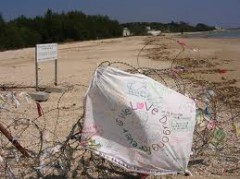
There has been local resistance movement since the relocation plan was announced. Localies near the Camp Schwab are concerned about deteriorating of their living environment. A lot of environmental activists oppose the plan as well because of abundance of wild life, which are very unique, only found in that place. One symbolic creature is dugongs, endangered marine mammals that eat sea grasses in that area. It is just strange that the nation that protests Japan’s whaling is helping another marine mammals endangered. Some activists are planning to take legal action against US government regarding this issue. Please read the enclosed newspaper article titled, Dugong plaintiffs consider new action in U.S. to block Henoko landfill.
If the project is implemented as planned, the sea will be reclaimed and dugongs and other creatures’ lives would be threatened. What will happen is your nation will be accused of helping diminishing of such wonderful and rare creatures for the interests of the few. The few, you might know, some business and government people who want some gains.
You might say it is what Japanese government handles, not what the US military is actively involved. No one in Japan thinks so. The US government can cancel that project and find another relocation site outside Okinawa. In fact US military presence in Okinawa and even nationwide is becoming nothing but troublesome.
More of us know US military presence no longer functions as defense or deterrence like in the Cold War era. China is said to be new threat but we know US-China relation has become more vital for your nation since China owns more US treasury bonds and buys more US goods than Japan does. President Obama spends more time having dialogues with Chinese leaders than with Japanese prime minister. We can easily predict the US would not help Japan even if China and Japan get into dispute for some reason. US cannot send troops to assist Japan because such action might cause great loss for your national interest.
Deploying your military so much in this country is just causing distrust against your country. I believe Okinawa issue arising is a great timing for your nation to rethink military deployment in Japan to better relationship between the two nations.
Sincerely,
------------------------------------------------------
I am planning to write more detailed version of the above later on adding some progress regarding Okinawa issues.
11:03 Posted in Ecology, Japan News, Politics, US-Japan relationship | Permalink | Comments (0) | Tags: okinawa, military
23 September 2013
Destroying "Finding Nemo"s World
Last weekend I visited Okinawa, Southernmost prefecture island. Over there I saw such cute view like Disney's animated film "Finding Nemo."
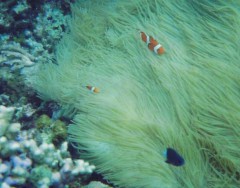
Clown fish over sea anemone with a blue fish. Looks like Marlin and his son, Nemo and their friend, Dolly. I was amazed but felt so sad at the same time. Because their lives are now in threat by planned construction of US Marine Base runway expanding from Camp Schwab.
The fish were in Ohura bay, which has been designated as most vulnerable place for environmental destruction because of rich bi-diversity such as clown fish, blue coral reef (the world biggest and Northernmost of its kind), dugongs and so on. If the runway is constructed by reclaiming the sea, the sea current will change and environmentally harmful substances would be released from the base. That must give adverse effect on wildife there.
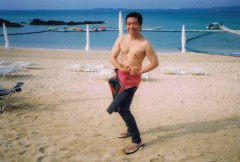
I scuba-dove into the sea from the opposite side of the bay to the U.S. Marine Base. Far away behind me in the above picture is where US Marine Camp is and where runway is planned to be constructed.
Growning opposition has emerged recently from localies. But the US and Japanese government are pushing hard to implement the project.
That coincides with hypocrisy in the film. That was, of course animated fiction. Fish don't talk and read. The film portrays them as good living creatures like human beings. In reality we eat fish and hunt them and put them in small aquarium unit just for viewing. In fact after the release of the film, clownfish were hunt overwhelmingly.
U.S. pretends like tropical fish loving and environmetally friendly nation but the reality is opposite and their act is very hyporitical. Not just Disney's fantazy but US policy against Japan's whaling. US is accusing Japan of whaling but at the same time it is harming most endangered marine mammals, dugongs in the bay with Defense Ministry of Japan. Some environmetal activists like Sea Shepherds even oppose dolphin hunting in Taich town of Wakayama Prefecture.
"Finding Nemo" is after all, Finding Nonesense and Hypocrisy.
12:48 Posted in Ecology, Film, Politics, Travel, US-Japan relationship, USA issues | Permalink | Comments (0) | Tags: okinawa, military
08 July 2012
Why we protest Restart of nuclear power plant
On July 1, 2012 one nuclear reactor, Ohi No.3 located in Ohi town in Fukui Prefecture was restarted. It was first time re-operation of nuclear power plant in Japan since 311 Fukushima nuclear crisis.
The government says it was to prevent blackout in case of energy shortage in heated summer. But the truth is to help electric power company from financial crisis. That is why so many people protesting the restart. More than 100 thousand people gathered in front of Prime Minister's House and Parliament building to shout "No Restart!" on the eve of restart.
In Ohi, local town of the nuclear plant, 7 hour bus ride from Tokyo, hundreds of people gathered at the entrace of the plant.
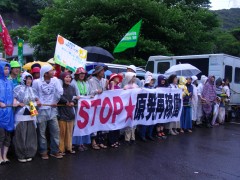
The problem is the plant had no safety measures to counter what happened in Fukushima. No wall to protect from tsunami, no filter ventilation, no earthquake resist building.
Even after a terrible disastor happened in Fukushima, there are people who want to forget about Fukushima and restart nuclear business.
In last two months, electricity was provided all over Japan without nuclear generation. That proves we never needed one. Japan has only relied 20-30% of energy on nuclear even before 311. It is easy to supplement that portion by other methods.
What we have to do is keep shouting protest against nuclear energy which is not only dangerous but cost-inefficient, harmful to the environment and human health even while regular operation. It consumes so much water and oil to dig and transport. Many got sick while digging uranium and maintenance. So much money is needed to operate including subsidies to local towns' poor budget in order to obtain approval for acceptance.
Stupid! We have to stop such stupidity.
14:33 Posted in Ecology, Japan News, Politics | Permalink | Comments (0) | Tags: nuclear power, fukushima






